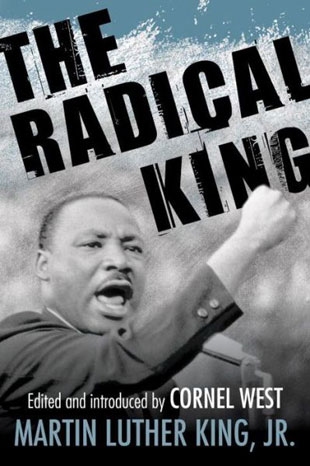This substantive collection of 23 selections by Dr. Martin Luther King, Jr., is the tenth title in The King Legacy Series published by Beacon Press, which includes sermons, orations, lectures, and prayers. This volume is edited and introduced by Cornel West, a professor of philosophy and Christian practice at Union Theological Seminary in New York who has written numerous books and is a frequent commentator in the media.
In his introductory piece, West, himself a radical thinker, points out that the FBI and U.S government saw the civil rights leader as a revolutionary Christian who had become "the most dangerous man in America." King showed his true colors when he came out against the war in Vietnam and called for a redistribution of wealth to eradicate poverty in America. Just before his death, polls showed how unpopular these prophetic stands were with the public: 72 percent of whites and 55 percent of blacks disapproved of both moral stands.
West continues in the introduction to note that today we are light years away from the radical King as a shining exemplar of nonviolence, as an anti-colonial and anti-imperial thinker and fighter, as a defender of the poor, and as a preacher of the kind of radical love embodied in the life and ministry of Jesus of Nazareth. With the kind of controversial flair West is known for, referencing the legacy of President Barack Obama, he notes:
"The dream of the radical King for the first black president was not a Wall Street presidency, drone presidency, and surveillance presidency with a vanishing black middle class, devastated black working class, and desperate black poor people clinging to fleeting symbols and empty rhetoric."
As we read these stirring sermons, speeches, and other selections by King, we were moved again and again by his authentic spiritual humility, integrity, and charisma. Here is King on Mahatma Gandhi, one of his heroes:
"And when he died, the only thing he owned was a pair of glasses, a pair of sandals, a loin cloth, some false teeth, and some little monkeys who saw no evil, who said no evil, and who somehow didn't see any evil. This is all he had. And if you ask people in India today why was it that Mahatma Gandhi was able to do what he did in India, they would say they followed him because of his absolute sincerity and his absolute dedication. Here was a man who achieved in his life the bridging of the gulf between the 'ought' and the 'is.' He achieved in his life absolute self-discipline."
Here is King on living a life of excellence no matter what:
"If you can't be a pine on the top of the hill, be a scrub in the valley. But be the best little scrub on the side of the hill. Be a bush if you can't be a tree. If you can't be a highway, just be a trail. If you can't be the sun, be a star. For it isn't by size that you win or you fail. Be the best whatever you are."
And, last but not least, here is King challenging members at Riverside Church in New York City to join him in the onerous but beautiful struggle for a new world."Now let us begin. Now let us re-dedicate ourselves to the long and bitter — but beautiful — struggle for a new world. This is the calling of the sons of God, and our brothers wait eagerly for our response. Shall we say the odds are too great? Shall we tell them the struggle is too hard? Will our message be that the forces of American life militate against their arrival as full men, and we send our deepest regrets? Or will there be another message, of longing, of hope, of solidarity with their yearnings, of commitment to their cause, whatever the cost? The choice is ours, and though we might prefer it otherwise we must choose in this crucial moment of human history."
